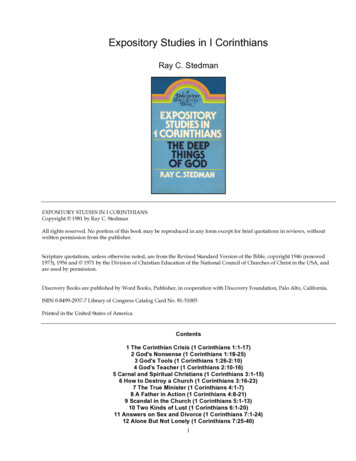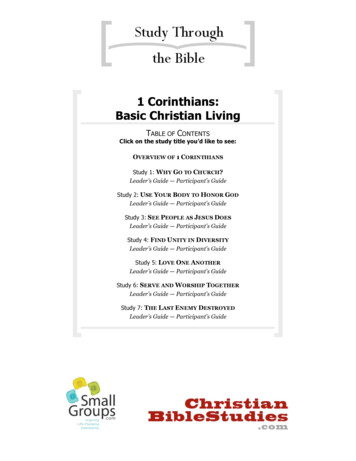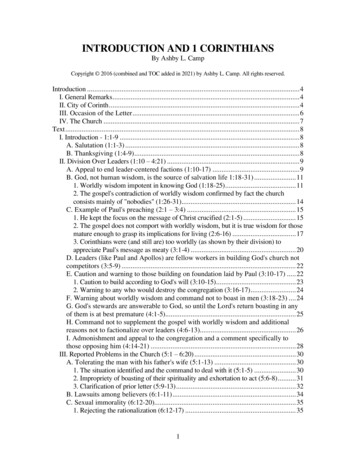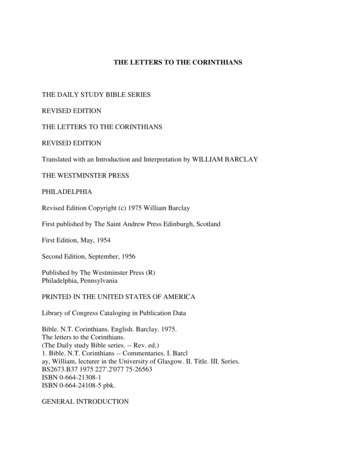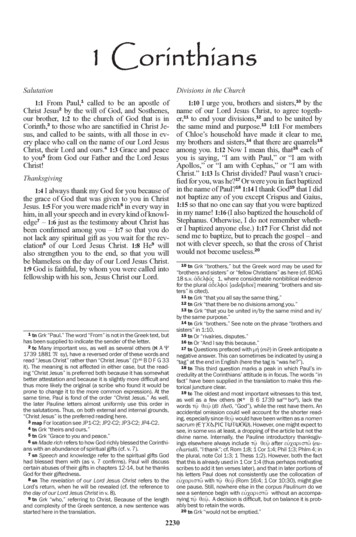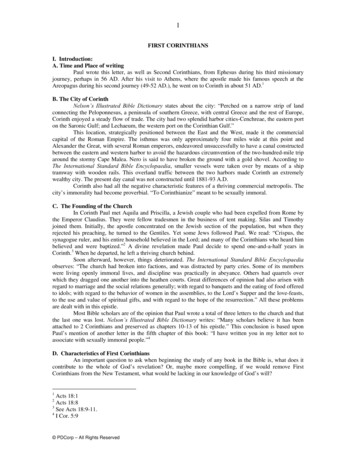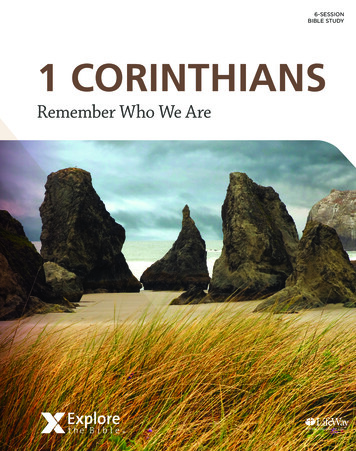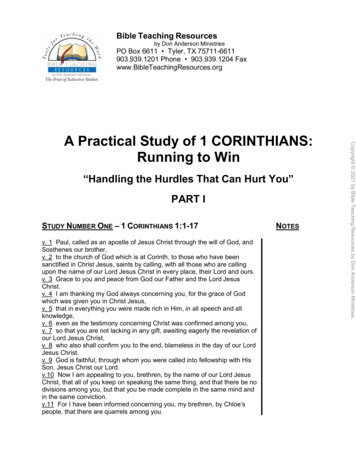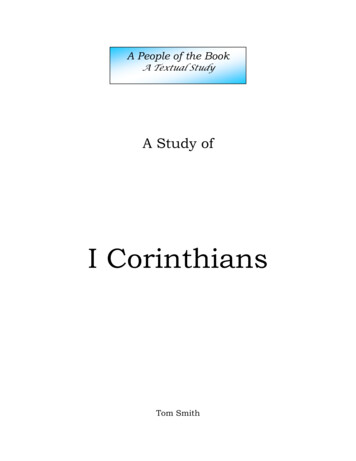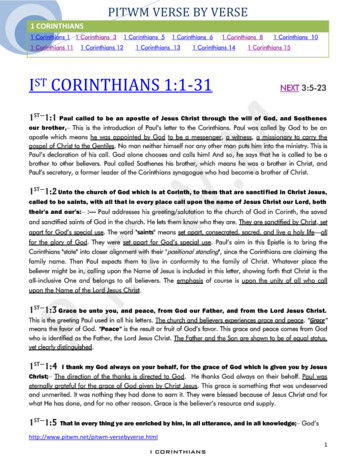
Transcription
1 CORINTHIANSLiving in the World, but Not of ItBy Kevin CotterIntroductionChapter 1: Wisdom about DivisionsCopyright 2012, 2016 – FOCUS (Fellowship of Catholic University Students).You are free to make copies for non-commercial use as along as youattribute the material to FOCUS. For commercial use please contact us.All Scripture texts from the New and Old Testaments are taken from RevisedStandard Version Bible: 2nd Catholic Edition, copyright 1989, 1993, Divisionof Christian Education of the National Council of the Churches of Christ inthe United States of America, unless otherwise noted. Used by permission.All rights reserved.22-89 - 22Chapter 2: In the World, but Not of the World23 - 36Chapter 3: Vocation37 - 50Chapter 4: Idol Meat and Evangelization51 - 64Chapter 5: Examples from the Past65 - 78Chapter 6: Spiritual Gifts and the Gift of Love79 - 91
LEADER’SINTRODUCTIONyears, Corinth hosted a mini-Olympics called the Isthmian Games.At the time that Paul wrote 1 Corinthians, Corinth was a boomingmetropolis, filled with mariners, merchants, tradesmen, and tourists.Paul makes four main points in the letter. He rebukes the Corinthiansfor their divisiveness and sin (1–6). Next, he addresses specificquestions they had about marriage and food offered to idols (7–10).The Big PictureGod’s word is alive and it should be embodied in our lives.Then Paul takes up issues regarding the Mass, charismatic gifts, thecentrality of love, and the importance of prophecy (11–14). Last, hefocuses on the victory of the resurrection of the dead and gives hisfinal greetings (15–16).For more on 1 Corinthians, see the FOCUS Equip article “AnWhat Do I Need to Know about This Study?Introduction to 1 Corinthians and the World of Ancient Corinth,” byKevin Cotter.St. Paul wrote his First Letter to the Corinthians while he was stayingin Ephesus, in response to problems in the church in Corinth. He hadoriginally evangelized the people in Corinth in 51 and 52 AD whilestaying with Priscilla and Aquila (see Acts 18). A few years later, aHow FOCUS Equip Studies Workcontingent from the Corinthian Church brought him news of divisionsEach FOCUS Equip study highlights one particular passage ofand difficulties. Paul is speaking to his own spiritual children in 1Scripture. As the leader, you guide a discussion about the passage,Corinthians (4:14). This is the second of four letters that Paul wrote towhich allows participants to discover truths within the passage forthe Corinthian church, though only two have been preserved.themselves. This process is called self-discovered learning. Its formatKnowing a little about Corinth’s history is key to understanding theletter. Corinth had been a major Greek city until the Romans destroyedcan help participants learn about Scripture and the way to discoverScripture on their own.it in 146 BC. They rebuilt it in 44 BC as a Roman colony for freed slavesand military veterans. It became the capital of the province of Achaia(modern-day Greece) and a major trade city because of its control oftwo ports on opposite sides of the Greek peninsula. It was infamousfor its licentiousness and social ladder-climbing. Many pagan templesdedicated to gods and goddesses such as Aphrodite, Asclepius,Poseidon, and even the Roman emperor filled the city. Every two23
IntroductionAt the same time, you are not left alone to understand the Scripturesready to go. You just need to pass out the notes, ask each questionby yourself. Each chapter will contain a section titled “What Do I Needas it is written, and read the answers to the questions, right? Well,to Know about This Passage?” It will provide you with details aboutnot exactly. It would not make for a very engaging Bible study. Thisthe passage, along with summaries about the passage’s big picture,material is a Bible study in a can: It is meant to preserve good-qualityhow it applies to Jesus, and how it can apply to your group.Biblical content and allow for a broad distribution, but someone stillneeds to take the material out of the can, spice up the content, andUNDERSTANDINGWHAT DO I NEED TO KNOWABOUT THIS PASSAGE?serve it to your study. That person is you.This is where the audience for your study is crucial; these are thepeople for whom you are “cooking.” Whether you have a group thathas never heard the Gospel before or a group that attempts to liveout the Gospel each day, you can adapt the Bible study to the group.The discussion guide supplies you with an opening question, someThe flexibility of this format is what can make it so effective.background information to share about the passage, and a set ofMost likely, however, you will have a group with both kinds of people.example questions and answers on each passage to use with yourFollow the example of my dance lesson: try to create a Bible studygroup.where beginners can learn the basics while the experts can berejuvenated. Scripture is a great way to do this. St. Gregory the GreatDISCUSSIONDISCUSSION GUIDE FORYOUR BIBLE STUDYPrepare by studying “What Do I Need to Know about This Passage?”once said, “Holy Scripture is a stream in which the elephant may swimand the lamb may wade.” Both groups should be able to discoversomething meaningful in the Scripture passage.For more on How to Lead a Bible study, check out our resourceon FOCUSEquip.org. As a review, FOCUS Bible study leaders have3 roles and 3 goals in each study.before the Bible study, and then use the discussion guide to direct theconversation with your group.Your 3 Key RolesHow to Prepare Your StudyWith all of this information at your disposal, you are all set and4With all of the above information in mind, remember that you have3 key roles in this study. These 3 roles are your contribution to thestudy, and doing these 3 things well will make the study successful.5
Introduction1.2.3.Prayer: Ultimately, it will be God Who changes the lives ofpart of a Bible study club, but allow the Lord to transform ourthe participants. By personal prayer and praying for yourlives. Specifically, we hope that students, through Scripture,participants, you open the door for God to accomplish greatare drawn more intimately to our Lord in the sacramentsthings. Please take time to pray for your group, talking withand liturgy of the Church where they can most fully receiveGod about each participant.the gift of God’s grace in their ,getting2.Intimate Fellowship: If people are going to be deeplyto know them, meeting them outside of Bible study, andtransformed, they will need others along the way, not only tobecoming real friends will be a great asset to the study.help this transformation, but also to make sure they continueCreate an environment that is open and personal, allowingthis transformation in the future. Your goal as a leader isparticipants to feel comfortable expressing their thoughtsto take a group of people with various backgrounds andand experiences.personalities and help them form authentic relationshipswith one another.Facilitator: A good discussion really enhances the fruitfulnessof a Bible study. Take the time to review the study and ask3.Spiritual Multiplication: Another important dynamic of smallgood, relevant questions to your group. Guide the discussion,groups is their ability to be reproduced. As you lead, prayallowing everyone to participate. Bring the discussion backthat the Lord will raise up members of your small group to goif it gets too far astray.on to disciple others and to lead Bible studies of their own.Your 3 Key GoalsFinal NoteThere will, no doubt, be many questions and discussions that comeOne of the best ways to learn how to lead a Bible Study is to learn fromup throughout the study. You may even find yourself a bit lost hereothers. Consider observing someone else’s Bible study to learn howor there. However, the goals listed below are what you are ultimatelythey have been successful. Also, ask a missionary or your disciplertrying to accomplish. Keeping these in mind throughout the study willto come to your study and give you feedback on how you are doing.help you stay on course.1.Deep Transformation: Through interaction with God’s wordand one another, it is our hope that the lives of your Bible6The Challengestudy members will be profoundly changed. The purpose ofTo properly lead this study, you will need to prepare in advance anda Bible study is not to simply learn information or to be aapply God’s word in your own life.7
NOTESChapter 1Wisdom about Divisions1 Corinthians 1–2UNDERSTANDINGPages 10 - 15DISCUSSIONPages 16 - 2289
Understanding / Wisdom about DivisionsUNDERSTANDINGWHAT DO I NEED TO KNOWABOUT THIS PASSAGE?Read 1 Corinthians 1–2is instigated by God’s calling and grace in our lives, not our own virtue(CCC 1996–99). Verses 4–9 also introduce several main themes foundin the letter as a whole: knowledge, speech, spiritual gifts, the day ofthe Lord, and fellowship.Divisions (1 Corinthians 1:10–17)In this section, St. Paul contrasts the fellowship they have in JesusChrist (v. 9) with their divisions. St. Paul established the churchin Corinth in 50 AD and spent a year and a half ministering to theThe Big PictureCorinthians. Other Christian leaders, such as Apollos and Cephas (St.St. Paul’s solution to the divisions in Corinth is to look to the cross.Acts 18:24-28.) Now, some believers claim St. Paul as their leader whilePeter), continued St. Paul’s work in Corinth. (For more on Apollos, seeothers claim St. Peter or Apollos; these allegiances may be based onwho baptized them (v. 12, 14-15).Chapters 1 and 2 immediately dive into the problems and culture ofthe church in Corinth. The community appears as a sick patient; St.Paul serves as a doctor who quickly identifies the illness (division)while figuring out one of the root causes (worldly wisdom).St. Paul tries to bring them back to reality—Jesus Christ is thefoundation of the Church (v.13). All believers should be united underthe power of the cross, not a particular leader (v. 17). In trying todiscourage such allegiances to their baptizers, St. Paul can appear todiminish the sacrament of baptism. And yet, it is clear the St. Paul isvery much in favor of baptism (see, for instance, 1 Cor 12:13 and GalIntroduction (1 Corinthians 1:1–9)3:27, among others).St. Paul begins by identifying himself as an apostle and also mentionsSosthenes as an author of the letter. (Sosthenes is most likely a convertruler of the Corinthian synagogue named in Acts 18:17.) As he hasdone in other letters, St. Paul tries to lift his readers’ eyes to what theyare called to—heaven (v. 2). Despite the problems and immorality inthe Corinthian church, St. Paul has no problem identifying them assaints (v. 2). Sainthood does not always equal perfection; at its root, it10The Wisdom of the Cross (1 Corinthians 1:18–31)St. Paul tries to get to the very root of the problem. The divisions areultimately caused by the Corinthians’ acceptance of Greek wisdomand rhetoric. In Corinth, philosophers and rhetoricians receivedthe same fame and adoration that movie stars and athletes have11
Understanding / Wisdom about Divisionstoday. Those with the best skills at rhetoric were seen as the mosttrustworthy sources of knowledge. In accepting this way of thinking,the Corinthians are caught up in the rhetorical value of theirarguments and of the Church leader they follow.St. Paul’s Wisdom (1 Corinthians 2:1–5)St. Paul admits that he did not preach with eloquent wisdom whenhe first founded the Church in Corinth five years earlier (2:1; 1:17).Rather than offering Greek wisdom, St. Paul unashamedly offers theSt. Paul communicates to the Church that the gospel does not workwisdom of the Spirit of God (vv. 2–4). St. Paul is proud of this: Helike Greek philosophy. The Faith is built not on worldly wisdom butdoesn’t want the faith of the Corinthians to rest on a sophisticatedon the wisdom of the cross (v. 18). This is easier said than done; aspresentation, but rather to rest on the cross of Jesus Christ.St. Paul notes, the word (or eloquence) of the cross was foolishnessto those in the Roman Empire (v. 18). Being so used to the conceptof crucifixion, we can lose track of its original meaning. The modernequivalent would be like saying, “The wisdom of the electric chair.”Application to Our LivesWe can encounter God through His living Word, which can speak intoIn light of the power of the cross, the wisdom of the world appears toour lives.be foolishness (v. 19). St. Paul calls out the wise man (philosopher),the scribe (lawyer), and the debater of this age (the rhetorician) asexamples of worldly wisdom (v. 20). The cross has dispelled theseforms of wisdom; now the Corinthians need to follow the truewisdom accordingly (vv. 24–25).While the wise, both Jew and Greek, have a difficult time acceptingthis cross (vv. 22–24), the foolish of the world have a much easiertime. St. Paul’s prime example: the Corinthians themselves (vv. 26–27). Ultimately, the nature of God is to choose the lowly to shamethe proud. Why? “So that no flesh might boast in the presence ofGod” (v. 29).The Wisdom of This Age (1 Corinthians 2:6–9)St. Paul continues to contrast “the wisdom of this age” with thehidden mysterious plan of God—the wisdom of the cross (vv. 6–8).It is apparent that the wisdom of the world had quite a hold on theCorinthians. One’s economic prosperity was partially dependent onaccepting this wisdom. Unlike other places in the Roman Empire,Corinth was a place where someone could easily climb the ladder to abetter life. Much of this was a result of the Corinthians’ relationshipsand connections to others in the city. As a result, there was plentyof pressure to fit in and not damage these relationships. Seeing theApplication to JesusThe wisdom of Jesus’ cross is what God uses to shame the wise ofculture’s influence on these young Christians, St. Paul challenges theCorinthians to see the world from the perspective of God, not of theirneighbors.this world.1213
Understanding / Wisdom about DivisionsThe Spirit Versus Wisdom (1 Corinthians 2:10–16)NOTESFor St. Paul, the Spirit is the key in combating the wisdom of the world.The Spirit of God allows us to properly understand our gifts (v. 12) andinterpret spiritual truths (v. 13) as opposed to worldly wisdom. Finally,St. Paul contrasts the unspiritual or fleshly man with the spiritual (v.14). The spiritual man knows the mind of Christ, the ultimate wisdom.1415
Discussion / Wisdom about DivisionsDISCUSSIONDISCUSSION GUIDE FORYOUR BIBLE STUDY1 Corinthians 1–21. What is wrong with the Church in Corinth?Answer: Several divisions have formed within the community. Specifically,members are divided over which leader to follow.2. In his last public prayer, Jesus prayed for unity. Read John17:21–23. With this in mind, what are the effects of division?Answer: First, we go against the commandment of Jesus Himself. Second,when we fail to have unity, the world does not come to know the love ofGod and believe in Him.STEP 1: OPENERHave you ever had trouble getting along with someone?STEP 2: BACKDROPChapters 1 and 2 immediately dive into the problems and culture ofthe Church in Corinth. The community appears as a sick patient, andSt. Paul serves as a doctor who quickly identifies the illness (division)while figuring out one of the root causes (worldly wisdom).STEP 3: PASSAGE3. How has division influenced the Christian Church throughouthistory?Answer: The Church has been plagued by division throughout its history.In the early Church, there were many divisions over the identity of Jesus.In the 11th century, the Eastern Orthodox Church broke off from theCatholic Church. In the 16th century, the Reformation occurred. Thelast two centuries have seen an increasing number of divisions and newChristian denominations.Today’s passage is 1 Corinthians 1-2. Start by reading 1 Corinthians1:1-17.STEP 4: EXPLORATION: QUESTIONS AND ANSWERS4. What do you think causes division in our Church today?Allow the group to discuss.Note that answers appear in italics.1617
Discussion / Wisdom about Divisions5. Even though 1 Corinthians is filled with problems like division9. What role do you think the media (news, television shows,and sexual immorality, why do you think St. Paul still called themovies, etc.) play in influencing us to trust the wisdom andCorinthians “sanctified” (or “holy,” in the Greek) in verse 2?advice of the world?Answer: Despite their problems, God had still called them into a relationshipAnswer: Even without intentionally affirming the actions and ideas foundwith Him. God’s grace and calling are much more foundational in ourin the media, we can still subtly accept them and allow them to influencestatus before God. Sainthood does not necessarily mean perfection (CCCus on topics ranging from how we view dating, marriage, wealth, self-1996–99).image, and other issues.Read 1 Corinthians 1:18–31.10. In CCC 2727, how does prayer help us combat the wisdom ofthe world?Answer: “Prayer is a mystery that overflows both our conscious and6. Why would the cross be a stumbling block to Jews and a follyunconscious lives.”to the Gentiles?Answer: For the Jews, they were expecting a Messiah who would overthrowthe political powers at hand (the Romans). Jesus’ death on the cross atRead 1 Corinthians 2:1–9.the hands of the Roman authority seems to be absolutely contrary tothis idea. For the pagans, the cross was their form of capital punishment.Saying “the wisdom of the cross” would be like saying “the wisdom of theelectric chair” today.11. Why do you think the wisdom of the world was so temptingfor the Corinthians to follow?Answer: Refer to the “The Wisdom of This Age” section in “What Do I Needto Know about This Passage?”7. What are some of the popular philosophies and thinkers ofour day?Allow the group to discuss.12. Think about a time when a professor was teaching somethingcontrary to Christianity in class. What goes through your mind inthese situations?8. Read CCC 2727. How does the wisdom of the world contrastAllow the group to discuss.with the teaching of Jesus Christ and the Church?Answer: In contrast with the teaching of Jesus Christ and the Church, thewisdom of the world looks at reason and science as the only sources oftruth, and material goods or sensuality as the ultimate goal.1819
Discussion / Wisdom about Divisions13. What is at stake for you as a student to say or live contrary tothis worldly wisdom?NOTESAllow the group to discuss.14. Looking at St. Paul’s argument and your own example, whatis the purpose of God’s use of the wisdom of the cross?Answer: Ultimately, it allows us to take pride in God alone.Read 1 Corinthians 2:10–16.15. For St. Paul, how should the Corinthians combat the wisdomof the world?Answer: St. Paul points to the wisdom found in the Holy Spirit as theirultimate guide.16. How will this solve their problem of division?Answer: Rather than trusting in the wisdom of the world or a particularleader, they will be guided by the same Spirit.17. How do you think we use the Spirit today to counter thewisdom of the world?Answer: The wisdom of the Holy Spirit is found in a number of ways today.The Bible was written under the inspiration of the Spirit and containswisdom for our lives (CCC 105). The Church is guided by the Holy Spiritin its teachings (CCC 688). Finally, we are given the gifts of the Holy Spirit(particularly wisdom, knowledge, understanding, and counsel) throughbaptism and confirmation (CCC 1831–32).2021
NOTESChapter 2In the World, but Not of the World1 Corinthians 5–6UNDERSTANDINGPages 24 - 29DISCUSSIONPage 30 - 362223
Understanding / In the World, but Not of the WorldUNDERSTANDINGWHAT DO I NEED TO KNOWABOUT THIS PASSAGE?Excommunication (1 Corinthians 5:3–5)St. Paul instructs them to expel this member from their congregation.Specifically, they are “to deliver this man to Satan for the destructionof the flesh, that his spirit may be saved in the day of the Lord Jesus”(v. 5). What exactly is St. Paul getting at? The hope is that, by being cutoff from the community, the person can realize his error, purify hisRead 1 Corinthians 5–6fleshly desire, and eventually be saved. (2 Corinthians 2:5–11 may bereferring to this individual.) This excommunication (literally, out of thecommunity or communion) shows the person the true consequencesChapter 5 and 6 continue St. Paul’s emphasis on getting at the rootof disunity. Earlier, he went after the topic of wisdom. Now, St. Paulof his actions. Separation from the Church shows concretely how aserious sin can separate one from God.will turn to particular actions of the Corinthians that are leading totheir disunity—sexual immorality and taking one another to court.The Exodus Background (1 Corinthians 5:6–8)While St. Paul is concerned with the individual, he sees this kindThe Big Pictureof immorality as harmful to the entire community. In order toThe Corinthians’ actions are causing disunity within their community.the Corinthians and the Israelites—parts of which are obvious, whiledemonstrate this, St. Paul makes an elaborate comparison betweenother pieces remain less clear.Sexual Immorality (1 Corinthians 5:1–2)St. Paul brings an embarrassing situation to the forefront of theconversation: The Corinthians are allowing one of their membersto remain in their congregation despite his incestuous relationshipwith his mother-in-law. St. Paul notes that this immorality is notfound even among the pagans (v. 1) and goes on to chide them fortheir arrogance (v. 2). The irony is thick: The Corinthians are pridefulExodus BackgroundMost people know that the Exodus was about freeing the Israelitesfrom slavery. Yet their slavery extended far beyond just a physicalbondage: The pagan worship of the culture served as a spiritualbondage that prevented the Israelites from truly worshipping andserving the Lord (Ex 3:7–12).because of their wisdom, yet not even the wisdom of the world findssuch an action acceptable!2425
Understanding / In the World, but Not of the WorldGod called the Israelites out of Egypt so that they could be set apartwithin the Church, St. Paul instructs us not to associate with believersto be a holy nation (Ex 19:1–6). God instructed each Israelite family towho commit serious sins (v. 11). (For more, see Mt 18:15–18 and 1 Corsacrifice a lamb to show this separation. The lamb was considered a11:29–32.) Comically, St. Paul notes that, if we applied this principle togod by the ancient Egyptians, and the slaughtering of a lamb was aeveryone in the world, we would need to go out of the world in ordercrime punishable by death. Through this sacrifice, each Israelite familyto carry it out (v. 10)! We are not called to judge those outside of themade a statement that they did not believe in Egyptian idolatry andChurch (v. 12).that they were willing to risk their lives for this belief. It was throughthis sign that the angel of the Lord spared the Israelites from the killingof the first-born sons (Ex 12:21–27). Finally, as a part of this meal, all ofthe Israelites were supposed to eat unleavened bread and remove allleaven from their homes (Ex 12:14–20).Lawsuits among Believers (1 Corinthians 6:1–11)St. Paul moves on to another practice that undermines community:lawsuits. Apparently, believers in Corinth are taking one anotherThe Corinthians have a similar problem: They are surrounded by theto court, which leads to several errors. First, on the surface, fellowidolatry and sin of the Corinthian culture (vv. 9–10). Likewise, St. Paul isbelievers suing one another does not seem like a constructive waycalling them to separate themselves from this culture. Jesus Christ, into build unity in the Church—a the very issue St. Paul is addressing.the Eucharistic meal, serves as their Passover lamb, who provides theirSecond, the Corinthians are setting a poor example by taking theirsalvation (v. 7). St. Paul extends the analogy of the leaven to the sin indisagreements, errors, and disunity in front of unbelievers (v. 1, 6).the community at Corinth: The Corinthian Christians must remove theThird, St. Paul returns to the theme of wisdom: If the Corinthians aresin in their midst in order to truly celebrate this festival (v. 8).so wise, they should be able to settle these matters on their own. Thisis another case where the Corinthians are trusting in the wisdom ofthe world rather than the wisdom of the Spirit found in their Church.Application to JesusFinally, St. Paul recognizes that some of the Corinthians may be takingJesus is our Passover lamb in the Eucharist, who gives us salvation andtheir fellow Christians to court specifically in order to defraud them (v.sets us apart to be a holy people.7–8). We know that it was a common practice in Corinth for the rich totake advantage of the poor through court cases by bribing the judgesor hiring superior lawyers.Judging Others (1 Corinthians 5:9–13)26While some Corinthians are deceiving others, St. Paul does not wantthem to be deceived about the consequences (v. 9). These actions willSt. Paul follows this analogy with some practical advice on how tolead a person not to inherit the kingdom of God. Homosexuality is oneapproach serious sin inside and outside the Church. Addressing sinof those actions listed—one of the few times that the New Testament27
Understanding / In the World, but Not of the Worldmentions homosexuality directly. (Specifically, the Greek word usedhere refers to homosexual acts, not just an orientation.) While theNOTESsin is severe, St. Paul doesn’t point this action out in order to have usshun these people. Following St. Paul’s advice earlier, we are called toshow them the grace Jesus offers. This can only be truly done throughan honest relationship and in love (CCC 2357–59; 1 Cor 5:9–13), notthrough arguments, attacks, stereotypes, and misunderstanding.Application to Our LivesSt. Paul challenges us to not judge those outside the Church but asksus to be firm with those inside the Church.2829
Discussion / In the World, but Not of the WorldDISCUSSIONDISCUSSION GUIDE FORYOUR BIBLE STUDY1 Corinthians 5–61. What problem does St. Paul address in the beginning ofchapter 5?Answer: A man is living with his father’s wife.2. Given the Corinthians’ tendency to rely on the wisdom of theworld, what is ironic about this problem?Answer: The Corinthians tend to trust more in the wisdom of the worldthan in the Spirit of God, but not even the pagans (with their worldlywisdom) find the man’s behavior acceptable.STEP 1: OPENERHave you ever been in a situation where you needed to speak upabout someone’s behavior, but had trouble doing it?STEP 2: BACKDROP3. What does St. Paul instruct the Church to do with this man?Answer: They are “to deliver this man to Satan for the destruction of theflesh, that his spirit may be saved in the day of the Lord Jesus” (v. 5).Chapters 5 and 6 continue St. Paul’s emphasis on getting at the rootof disunity, which he began in chapters 1 and 2. Earlier, he went afterthe topic of wisdom; now, St. Paul turns to particular actions of theCorinthians that are leading to their disunity—sexual immorality andtaking one another to court.STEP 3: PASSAGEToday’s passage is 1 Corinthians 5–6. Start by reading I Corinthians5:1–5.4. What do you think it would feel like to address this man aboutthis sin?Allow the group to discuss.5. What is the logic behind St. Paul’s instructions?Answer: By being cut off from the community, he can realize his error,purify his fleshly desire, and eventually be saved.STEP 4: EXPLORATION: QUESTIONS AND ANSWERSNote that answers appear in italics.3031
Discussion / In the World, but Not of the World6. Read 2 Corinthians 2:5–11. Some commentators have11. How are we supposed to approach those inside of the Churchrecognized this person as the one in 1 Corinthians 5:1–5. What iswho are in serious sin?the final result?Answer: There should be a certain separation. Note that this caseAnswer: It appears that the man comes back to the Church. St. Paulspecifically involves people in the Church, committing serious sin, andinstructs them to love and forgive him.calling themselves faithful Christians. This does not mean that we shouldnot seek to win these people back to Christ. However, we cannot continuerelating to them in the same way. Think, for example, about how a parishRead 1 Corinthians 5:6–13.or diocese should respond to a person who publicly rejects many of theChurch’s teachings, but claims to be Catholic. There can be no formalassociation between the two.7. What point is St. Paul making with his analogy in vv. 6–8?Allow the group to discuss.12. What temptations do we face when there is a problem or sinthat needs to be addressed?8. Read Exodus 12:14–27. Explain the “Exodus Background” inAllow the group to discuss.“What Do I Need to Know about This Passage?”13. Read Matthew 18:15–18. What does Jesus tell us to do in these9. How do you think the Corinthians’ situation compares withthe one in Exodus?Answer: They are surrounded by the idolatry and sin of the Corinthians’situations?Answer: Address the person yourself. Then, bring others with you. Finally,tell it to the Church.culture (vv. 9–10). Likewise, St. Paul is calling them to be separated fromthis culture. Jesus Christ is the Passover lamb of their salvation (v. 7). Justas they remove the leaven, the Corinthian Christians must remove the sinin their midst in order to truly celebrate this festival (v. 5:8)14. What does St. Paul say about our associations with thoseoutside of the Church?Answer: We can associate with them, but we are not to judge them.10. In what ways are we called to be a holy people separatedfrom the world?Allow the group to discuss.3233
Discussion / In the World, but Not of the World15. Why is it tempting to stay isolated from the world?Allow the group to discuss.NOTES16. Practically, how do you think we find a balance being in theworld but not of the world?Allow the group to discuss.
Dec 01, 2020 · Read 1 Corinthians 1–2 The Big Picture St. Paul’s solution to the divisions in Corinth is to look to the cross. Chapters 1 and 2 immediately dive into the problems and culture of the church in Corinth. The community appears as a sick patient; St. Paul serves
